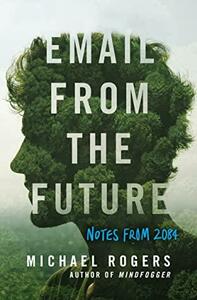Take a photo of a barcode or cover
What if we could change how we've messed up the planet and the people who inhabit it?
Aldus is a retired robot repairman and is writing emails, and essays, to his grandson, Luca. He writes about the history, climate change, strikes, famines, and other things that have transpired on Earth in the previous 64 years.
The entries flip flop between talking about general history of the world, Aldus's day to day life, and family history.
People live in walkables, fully self contained communities. The Internet has become something more. So many things about life have changed.
While this is a great story, it does feel a bit long winded and boring at times. Having g said that, the ideas in the book are thought provoking and do provide a possible course of action for the future.
Aldus is a retired robot repairman and is writing emails, and essays, to his grandson, Luca. He writes about the history, climate change, strikes, famines, and other things that have transpired on Earth in the previous 64 years.
The entries flip flop between talking about general history of the world, Aldus's day to day life, and family history.
People live in walkables, fully self contained communities. The Internet has become something more. So many things about life have changed.
While this is a great story, it does feel a bit long winded and boring at times. Having g said that, the ideas in the book are thought provoking and do provide a possible course of action for the future.
challenging
dark
emotional
hopeful
reflective
medium-paced
Thank you to Netgalley and the publishers for offering this book as a free e-book.
I quite enjoyed this. It wasn't my usual read, but I found myself drawn to it. A mysterious email lands in someone's mailbox and when they decrypt it they find a bunch of essays written by a man called Aldus, claiming to be from the 2080s.
Aldus writes his essays to his grandson, Luca, telling him about the world and how much it's changed since the 2020s. It's more of a memoir than anything with Aldus talking about his life, meeting his wife Mariana and having Luca's dad. There are a few references to times past, covid being one and it was just really interesting to see an alternate world to the one we live in now.
Obviously we know that the events in this book won't come to pass as some of the things mentioned happening in 2020 haven't actually happened, but it was nice to pretend that they had.
I quite enjoyed this. It wasn't my usual read, but I found myself drawn to it. A mysterious email lands in someone's mailbox and when they decrypt it they find a bunch of essays written by a man called Aldus, claiming to be from the 2080s.
Aldus writes his essays to his grandson, Luca, telling him about the world and how much it's changed since the 2020s. It's more of a memoir than anything with Aldus talking about his life, meeting his wife Mariana and having Luca's dad. There are a few references to times past, covid being one and it was just really interesting to see an alternate world to the one we live in now.
Obviously we know that the events in this book won't come to pass as some of the things mentioned happening in 2020 haven't actually happened, but it was nice to pretend that they had.
An amazing start and general approach to a futurist text with plausible predictions that do not ring obvious and balance the impact of different factors with care.
But the book becomes slow moving and difficult to appreciate once we move into the story and questions arise that are often left unanswered in an organic way.
Overall while the format and content was good I would have wished for a change in pace and explanatory style mid way.
But the book becomes slow moving and difficult to appreciate once we move into the story and questions arise that are often left unanswered in an organic way.
Overall while the format and content was good I would have wished for a change in pace and explanatory style mid way.
*I received a review copy via Netgalley.
Email from the Future was a much different book than I was expecting. I liked some of the ideas the author had. The style of writing was refreshing to read. At the same time, the world feels too perfect and simplistic. The tone is aggressively optimistic. It can also be hard to follow, since information isn’t clearly conveyed to the reader. It would be hard to say who I’d suggest this book to, but it’s not a bad read.
My full review can be found here
Email from the Future was a much different book than I was expecting. I liked some of the ideas the author had. The style of writing was refreshing to read. At the same time, the world feels too perfect and simplistic. The tone is aggressively optimistic. It can also be hard to follow, since information isn’t clearly conveyed to the reader. It would be hard to say who I’d suggest this book to, but it’s not a bad read.
My full review can be found here
Thank you to the publisher for allowing me an ARC copy of this book.
This book is an important read and I really liked the concept of it so much.
Email From The Future is a fiction delving into the future of humanity.
Aldus is a GenZ coming to the end of his life in 2084 and has decided to write to his grandchild explaining why the world is the way it is. The book is split into different sections and delves into climate change, COVID (so if covid in books is not your thing, I would give this a miss) education, crime & religion just to name a few.
If you use reading for escapism, this is definitely not for you. Existential crisis and hatred for humanity as we know it is a given with this book.
However, if you are worried about the future and interested in how the world will evolve OR you know someone that needs a realty check on where humanity is heading, This book could be for you.
Definitely reads like a non-fiction and is a slow paced book I found myself having to put down at times. Also about 50% in I found myself starting to get a little bored and skimming some sections.
That being said, I think it’s an important read and I’m definitely going to be recommending this to both my environmentalist friends and friends that I keep trying and failing to have conversations about our future with.
Thank you!
This book is an important read and I really liked the concept of it so much.
Email From The Future is a fiction delving into the future of humanity.
Aldus is a GenZ coming to the end of his life in 2084 and has decided to write to his grandchild explaining why the world is the way it is. The book is split into different sections and delves into climate change, COVID (so if covid in books is not your thing, I would give this a miss) education, crime & religion just to name a few.
If you use reading for escapism, this is definitely not for you. Existential crisis and hatred for humanity as we know it is a given with this book.
However, if you are worried about the future and interested in how the world will evolve OR you know someone that needs a realty check on where humanity is heading, This book could be for you.
Definitely reads like a non-fiction and is a slow paced book I found myself having to put down at times. Also about 50% in I found myself starting to get a little bored and skimming some sections.
That being said, I think it’s an important read and I’m definitely going to be recommending this to both my environmentalist friends and friends that I keep trying and failing to have conversations about our future with.
Thank you!
Thank you to Netgalley and the publishers for offering this book as a free e-book.
I quite enjoyed this. It wasn't my usual read, but I found myself drawn to it. A mysterious email lands in someone's mailbox and when they decrypt it they find a bunch of essays written by a man called Aldus, claiming to be from the 2080s.
Aldus writes his essays to his grandson, Luca, telling him about the world and how much it's changed since the 2020s. It's more of a memoir than anything with Aldus talking about his life, meeting his wife Mariana and having Luca's dad. There are a few references to times past, covid being one and it was just really interesting to see an alternate world to the one we live in now.
Obviously we know that the events in this book won't come to pass as some of the things mentioned happening in 2020 haven't actually happened, but it was nice to pretend that they had.
I quite enjoyed this. It wasn't my usual read, but I found myself drawn to it. A mysterious email lands in someone's mailbox and when they decrypt it they find a bunch of essays written by a man called Aldus, claiming to be from the 2080s.
Aldus writes his essays to his grandson, Luca, telling him about the world and how much it's changed since the 2020s. It's more of a memoir than anything with Aldus talking about his life, meeting his wife Mariana and having Luca's dad. There are a few references to times past, covid being one and it was just really interesting to see an alternate world to the one we live in now.
Obviously we know that the events in this book won't come to pass as some of the things mentioned happening in 2020 haven't actually happened, but it was nice to pretend that they had.
I got a free kindle version from a goodreads giveaway.
My first dnf (although to be fair, I’m only just now back into reading so I’m usually hitting the ones I’m confident I’ll like). I’m all for optimistic/hopeful scifi, don’t get me wrong. Becky Chambers? Love her writing! I found this to be an odd combination of feeling nonfiction, preachy, and unrealistically hopeful. Perhaps I’m just too pessimistic after all.
Regardless, it just didn’t pull me in even after 20%, and so for the first time, dnf.
My first dnf (although to be fair, I’m only just now back into reading so I’m usually hitting the ones I’m confident I’ll like). I’m all for optimistic/hopeful scifi, don’t get me wrong. Becky Chambers? Love her writing! I found this to be an odd combination of feeling nonfiction, preachy, and unrealistically hopeful. Perhaps I’m just too pessimistic after all.
Regardless, it just didn’t pull me in even after 20%, and so for the first time, dnf.
challenging
emotional
hopeful
informative
reflective
relaxing
sad
slow-paced
Dystopian sci-fi is so last year!
Aldus was born in 2010 and had the great fortune to live in a 21st century in which the world had found the wisdom, the strength, the will, and, for the most part at least, the political courage to do almost everything right. The world wasn’t perfect but might be described as a reasonable approximation to a utopia. Aldus, a robotics technician, is living in the year 2084 in which the existential threat posed by accelerating global warming has been defeated and exponential population growth has been reversed. But, at the “tender” age of 74 (a far cry from the expected current life spans of 120 to 130 years), Aldus, who was infected with Covid as a child during the pandemic of the 2020s, is suffering from a long Covid ailment that will likely lead to a debilitating form of dementia and an untimely and early demise. Accordingly, he has decided to deal with that slow burn long-delayed infection by writing a history of the 21st century. EMAIL FROM THE FUTURE is that history which anonymously appeared in a current day blogger’s e-mail in-box via a 2084 quantum time-shifting technology that allows the transmittal of information through time.
While the back cover marketing blurb described EMAIL FROM THE FUTURE as a “utopian novel in the truest sense” that was “heartfelt, hopeful, and often humorous”, I would go much further and add the adjectives evocative, provocative, cautiously optimistic, entertaining, instructive, and thought-provoking. Some of the topics that would be considered in a series of futurist essays are obvious – global climate change, education, taxation, and organized religion, for example. But the actual list of topics that Rogers examined through his imaginative yet well-considered crystal ball was much more extensive than that – robotics, death and aging, the internet, transportation, crime, racism, homophobia, women’s rights, sentience and consciousness, space exploration, food, automation, employment and universal income, genetic engineering, sex, gaming, virtual reality and much, much more.
From front cover to back, EMAIL FROM THE FUTURE is jammed pack with quotable quotes, each one of which considered on its own would be quite capable of generating research, careful consideration, debate, and hours of thought between friends or book club members. Just a handful of examples to illustrate:
On wealth and consumerism:
“Today to die with excessive wealth reflects a life poorly lived. One leaves one’s children skills, values and a network of friends. These are true legacies. … Today to be called a “consumer” is an insult”
“If you eliminate the fear of losing one’s income, as we have with Living Income, and ensure that every citizen has physical and mental wellness, and that most people are not grossly dissimilar in actual wealth, the incidence of pathologic greed drops precipitously.”
On science and health care:
“…my [digital] double saved my life when I was 60; it signaled an aortal wall weakness that would have caused an aneurysm and stroke within a few years. Dr Leah sent me to a surgeon who injected a nanostent that resurfaced the interior of the aorta with stem cells. I came back in the next day, she triggered autodissolve on the stent, and announced that I was good for at least another 60 years.”
On politics in a modern America threatened by right-wing neo-fascism and evangelical Christian theocracy:
A “shift in the voting population made the official Second Constitutional Convention possible. Convened in Philadelphia in the late 2030s, there were four Amendments: a guarantee of all-gender rights, fully public election funding, shelter and healthcare as rights, and a legal framework for digital voting to replace the electoral college.
“The establishment of fully public election funding was perhaps the single greatest defeat for the ultrarich and the corporate powers in the US. … ideas, not money, should be the fuel of elections.”
If you’re a Trumpian in the USA or a hard-core nationalist conservative from some other country plagued by the growth of right-wing hatred, then EMAIL FROM THE FUTURE will almost certainly stick in your craw and bring you to the point of gagging. On the other hand, if your thinking is already leaning to the left or if your are a centrist or marginal right-winger open to new ideas that might prompt you to re-consider where the world is headed, then I can’t recommend EMAIL FROM THE FUTURE strongly enough. You need to read this. You need to read it now!
Paul Weiss
Aldus was born in 2010 and had the great fortune to live in a 21st century in which the world had found the wisdom, the strength, the will, and, for the most part at least, the political courage to do almost everything right. The world wasn’t perfect but might be described as a reasonable approximation to a utopia. Aldus, a robotics technician, is living in the year 2084 in which the existential threat posed by accelerating global warming has been defeated and exponential population growth has been reversed. But, at the “tender” age of 74 (a far cry from the expected current life spans of 120 to 130 years), Aldus, who was infected with Covid as a child during the pandemic of the 2020s, is suffering from a long Covid ailment that will likely lead to a debilitating form of dementia and an untimely and early demise. Accordingly, he has decided to deal with that slow burn long-delayed infection by writing a history of the 21st century. EMAIL FROM THE FUTURE is that history which anonymously appeared in a current day blogger’s e-mail in-box via a 2084 quantum time-shifting technology that allows the transmittal of information through time.
While the back cover marketing blurb described EMAIL FROM THE FUTURE as a “utopian novel in the truest sense” that was “heartfelt, hopeful, and often humorous”, I would go much further and add the adjectives evocative, provocative, cautiously optimistic, entertaining, instructive, and thought-provoking. Some of the topics that would be considered in a series of futurist essays are obvious – global climate change, education, taxation, and organized religion, for example. But the actual list of topics that Rogers examined through his imaginative yet well-considered crystal ball was much more extensive than that – robotics, death and aging, the internet, transportation, crime, racism, homophobia, women’s rights, sentience and consciousness, space exploration, food, automation, employment and universal income, genetic engineering, sex, gaming, virtual reality and much, much more.
From front cover to back, EMAIL FROM THE FUTURE is jammed pack with quotable quotes, each one of which considered on its own would be quite capable of generating research, careful consideration, debate, and hours of thought between friends or book club members. Just a handful of examples to illustrate:
On wealth and consumerism:
“Today to die with excessive wealth reflects a life poorly lived. One leaves one’s children skills, values and a network of friends. These are true legacies. … Today to be called a “consumer” is an insult”
“If you eliminate the fear of losing one’s income, as we have with Living Income, and ensure that every citizen has physical and mental wellness, and that most people are not grossly dissimilar in actual wealth, the incidence of pathologic greed drops precipitously.”
On science and health care:
“…my [digital] double saved my life when I was 60; it signaled an aortal wall weakness that would have caused an aneurysm and stroke within a few years. Dr Leah sent me to a surgeon who injected a nanostent that resurfaced the interior of the aorta with stem cells. I came back in the next day, she triggered autodissolve on the stent, and announced that I was good for at least another 60 years.”
On politics in a modern America threatened by right-wing neo-fascism and evangelical Christian theocracy:
A “shift in the voting population made the official Second Constitutional Convention possible. Convened in Philadelphia in the late 2030s, there were four Amendments: a guarantee of all-gender rights, fully public election funding, shelter and healthcare as rights, and a legal framework for digital voting to replace the electoral college.
“The establishment of fully public election funding was perhaps the single greatest defeat for the ultrarich and the corporate powers in the US. … ideas, not money, should be the fuel of elections.”
If you’re a Trumpian in the USA or a hard-core nationalist conservative from some other country plagued by the growth of right-wing hatred, then EMAIL FROM THE FUTURE will almost certainly stick in your craw and bring you to the point of gagging. On the other hand, if your thinking is already leaning to the left or if your are a centrist or marginal right-winger open to new ideas that might prompt you to re-consider where the world is headed, then I can’t recommend EMAIL FROM THE FUTURE strongly enough. You need to read this. You need to read it now!
Paul Weiss





